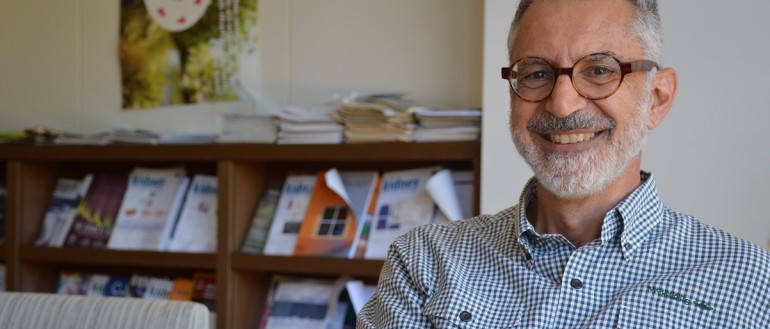Audiologist Dr Dino Hodge has a mad schedule. This is literal as well as figurative – every few weeks, he does the rounds of Melbourne, Adelaide and Darwin, traveling home to each state where he has personal and professional ties.
This nomadic lifestyle isn’t new to Dino. He spent the last six years travelling from his home in Melbourne to the Northern Territory as a paediatric audiologist with the NT Hearing Health Program, assessing the hearing of children in Indigenous communities. Prior to that, he spent his time in the NT with the Commonwealth Department of Health and the Human Rights and Equal Opportunity Commission.
Dino is comfortable calling each city home. In Darwin, he is the first audiologist to be recruited to the Child Health Team at Menzies School of Health Research, working on a project called VOICES, or Vaccines to prevent Otitis media in Children Entering School.
He still has family in Adelaide, and while in Melbourne, he is an Honorary Senior Fellow at the University of Melbourne’s Centre for Indigenous Studies. There, he is also currently supervising a young Aboriginal man’s PhD research on men’s health.
“All of this keeps me on my toes, both clinically and in research terms,” said Dino.
“Hearing tests help families understand the impact of otitis media on their child’s communication and development; families play a critical role in helping children understand and engage with what’s going on within the family unit, in the classroom, and also with the community.”
His varied areas of expertise – he is a clinical audiologist with a PhD in history and a background in social work – has created a skill set unique to Dino. These factors combined have made him a good fit with the rest of the project.
VOICES, a National Health and Medical Research Council-funded study, will measure the long-term benefits of different vaccine schedules to better understand the impact of ear disease and hearing loss in early childhood.
From the end of March, the team – assisted by an audiology student and medical student - will begin assessing the hearing of young children with middle ear infections and its impact on their school-readiness.
Dino's experience in remote paediatric work, a good working knowledge of the communities, and familiarity with the Hearing Health Program has helped him get off to a running start.
“I came on board because one of the project’s aims is discovering which elements of intervention are most effective in the management of ear disease,” he said.
“There is a need for science-based evidence with a longitudinal study on the impact of ear disease on children, and how that affects their schooling and future employment and overall quality of life.”
In the next two years, subject to funding continuation, Dino and the team will visit the Wadeye, Wurrumiyanga and Maningrida communities in the NT to test the hearing of children aged one to three years at six monthly intervals.
At this stage, Dino is immersed in establishing the groundwork to record fieldwork evidence.
“We’re deciding on which diagnostic tests to use, the study protocols, and organising equipment and computer data systems,” he said.
“We’re aiming to get as much information as we can to help us show governments how we can appropriately target ear disease.”
To learn more about the VOICES project, click here.

